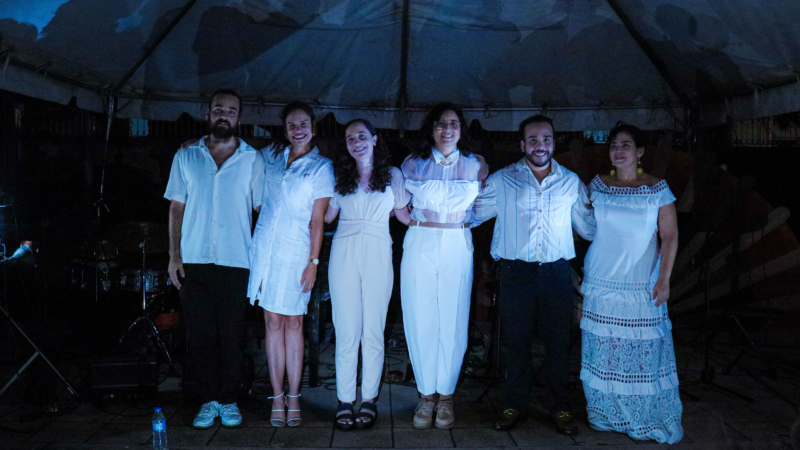Her piano concert was six years in the making. Then Puerto Rico’s power went out
It’s been a blackout summer in Puerto Rico.
The electric grid has been so unstable that residents often lose power several times a week. Even so, Daniela Santos, a classical pianist, didn’t allow herself to entertain that possibility on the day she was to debut a musical project six years in the making.
She’d spent years scouring archives to uncover long-forgotten works by 19th century Puerto Rican composers — especially women.
She dusted off and transcribed manuscripts, digitized them and convened an ensemble of musicians for four concerts across the island. Most of the pieces hadn’t been performed in over a century. Some, as far as she knew, not ever. But they were crucial for a full understanding of the history of classical Puerto Rican composition and the overlooked contributions of women.
On Aug. 24, it was show time.
Her first concert, in the southern city of Ponce, started smoothly. But then, 20 minutes in, it happened. Mid-song, the power went out with a pop that made Santos nearly jump off her piano bench. Her electronic keyboard went silent. So did the microphone of Tatiana Irizarry, a soprano she was accompanying. The audience gasped.
“I was utterly frustrated,” Santos said. “It was a complete sadness.”
Puerto Rico’s constant outages send old people scrambling to find backup power for ventilators. They spoil the food in people’s refrigerators. They force restaurants and shops to close. And they’re increasingly disrupting Puerto Rico’s rich arts and culture scene.
Video of Santos’ interrupted performance spread quickly, touching a nerve because of how clearly it drove home the widening toll of Puerto Rico’s power crisis. Most people blame the government and LUMA, the private company that took over the dilapidated public grid three years ago, promising improvements. In fact, outages are getting worse. The regular blackouts are a reality people are infuriated over, but also learning to cope with.
On the evening of Santos’ concert, the power never returned. But Santos and her ensemble carried on with the show, improvising with a guitar, percussion and their voices. As night fell, supportive audience members illuminated the outdoor stage with their cellphones.
Like many Puerto Ricans, Santos said she often questions whether to continue trying to make her art in Puerto Rico. The economic and power crises have driven many young creatives to move away. Despite her doubts, Santos said she’s chosen to stay.
“I’ve decided to be in a commitment with the people of Puerto Rico, because they deserve it,” she said. “And to be in commitment with the music, with the culture. Even if we couldn’t do the concert, even if it’s the darkest of times, we have to keep going. That’s the commitment.”
Her next concert in the series, which honors the legacy of Ana Otero, one Puerto Rico’s early woman pianists and composers, is on Saturday.
Note: In the radio piece above, you can listen to Santos reflect on what happened the night the power went out, and hear her play the song that the outage cut short.
The latest on the Land Back movement, in which Native American tribes reclaim land
The Land Back Movement is an effort by native Americans to reclaim lost land. Two reporters take a look at where it’s worked and where it hasn’t at reservations in Minnesota.
What the upcoming election looks like for Georgia GOP chairman Josh McKoon
NPR's Mary Louise Kelly talks with Georgia Republican Party chair Josh McKoon in Atlanta ahead of the 2024 presidential election.
Congress votes down spending bill as government shutdown looms
Congress is running out of time to avert a government shutdown. House Republicans will put up a partisan proposal that does not even have enough votes within their own party.
The New Georgia Project aims to reach 1 million residents – one door at a time
NPR's Mary Louise Kelly reports from the swing state of Georgia on efforts to rally Republican and Democratic voters.
In Lebanon, more electronic devices blew up during funerals from Tuesday’s attacks
In Lebanon, funerals took place for a dozen people killed by exploding pagers targeting Hezbollah — but as they buried their dead, more electronic devices blew up, claiming yet more lives.
Here are 4 ways the Federal Reserve’s big rate cut could change the housing market
Here's a look at what the Federal Reserve's rate cut will mean for those looking to buy — or sell — a home.



